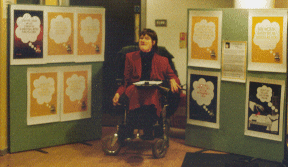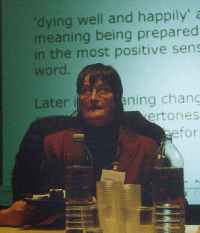|
||
 A speech given at “Hands off our Genes ”
A speech given at “Hands off our Genes ”
A National Conference for Disabled People
Hosted by 
On the 24th January 2004 in Newcastle upon Tyne
 Fighting Euthanasia
Fighting Euthanasia
Points raised by Delegates afterwards are included in bold. These were told to me on a one to one basis because there wasn’t time for questions or comments from the floor. We have done everything we can to preserve their anonymity. These comments are very important and we didn’t want them to be lost.
 Introduction
Introduction
Although my second disability has made me more so, I have been moderately but very visibly disabled since birth. I spent almost 30 years trying to prove that I was as good as the able others. I went to uni, got married and had our first son before I graduated. Brett was one year old when I finished so I already had a full time job! That wasn’t enough though so we had another son Chris too! During the years that the boys were growing up I learnt to paint. I was in at the beginning of the disability arts scene. When I heard Vic Finklestein’s laying out the wonders of the social model of disability he released me from the bondage of having to prove anything. I learnt that my disability was something to be proud of and celebrated not denied.
About 8 years ago something, and for the life of me I don’t know what, turned a vague feeling that was only just there, into a real fear that my life would be cut short if the medical profession ever really got its hands on me. Paranoia? Maybe, but it was real enough for me to write a play. That was the beginning of my fight against euthanasia.
Before I launch into the subject however, I would like to emphasise that the selection against disabled people is happening right through the life cycle. Other speakers have already talked about genetic testing before and after conception and I am going to talk about adults and people nearing the end of their lives. The selection also happens at another point too. Any new born baby deemed to be ‘too disabled’ is left without treatment. So at no point in life is a disabled life ‘safe.’
 So What is Euthanasia?
So What is Euthanasia?
 Before preparing
for today I hadn’t realised that the word euthanasia means
"good death". It came into use in the seventeenth
century, meaning 'dying well and happily,' being prepared for
death in the most positive sense of the word. Later it's meaning
changed and it came to have overtones of 'putting someone to
death before their natural end'.
Before preparing
for today I hadn’t realised that the word euthanasia means
"good death". It came into use in the seventeenth
century, meaning 'dying well and happily,' being prepared for
death in the most positive sense of the word. Later it's meaning
changed and it came to have overtones of 'putting someone to
death before their natural end'.
Euthanasia has always had a bad meaning for me yet even now it is defined by the Brainy Dictionary as ‘An easy death; a mode of dying to be desired.’
 If it is a basically a humane practice what’s
the problem?
If it is a basically a humane practice what’s
the problem?
With the media’s vociferous portrayal of Diane Pretty’s campaign and Reg Crew’s assisted death it appears that to the media and the general public there isn’t a problem at all. With the rash of parliamentary bills that appeared during last year it didn’t look as though there were problems for many MPs either.
However it becomes a problem for the people who will have an early death administered, if they;
- don’t want it,
- have little control over when and how it will happen
According to the US Holocaust Memorial Museum in Nazi Germany
“Euthanasia was in fact a euphemism” a nice word that hides a nasty meaning “which Nazis had used during the war to mask a program of mass murder. And after the war, the same word was invoked to suggest that they had put 275,000 mental patients, severely mentally and physically disabled persons, to sleep.”
One delegate said this should have been made more of because most were killed before the war started when it was still illegal in Germany. The doctors had to do it quietly and make it look like their charges died of natural causes. Lots of the victims were starved in ‘Hunger Houses.'
Since then there have been many debates about the merits of euthanasia. Calls for legalisation recur regularly and very high ranking committees have looked into the practice. Most of those investigations in the UK have come out resoundingly against it
For example in 1994 The House of Lords Select Committee on Euthanasia decided that:-
"it was virtually impossible to ensure that all acts of euthanasia are truly voluntary and that any liberalisation of the law in the United Kingdom could be abused."
After extensive research, and the hearing of much evidence the committee regarded the present law as,
"the cornerstone of law and of social relationships. It protects each one of us impartially, embodying the belief that all are equal.
Yet the demands for legalisation keep coming.
Last year as a reply to letters ad booklets I sent to every MP and Peer I received a letter from the Department of Health stating that;
“Under the current law, euthanasia, the intentional taking of life albeit at the patients request for a merciful outcome, is unlawful and anyone alleged to have undertaken it is open to charge of murder or manslaughter. Similarly, medical treatment given to a patient with the specific intention of hastening or inducing death, whether at the patient’s request or not, is an illegal act. Assisted Suicide is unlawful under the 1961 Suicide Act. The government has no plans to change the law.”
Similarly when we lobbied the Annual Representatives Meeting of the BMA in Torquay last summer against them talking to the government about euthanasia the general reaction was “Oh don’t worry, we don’t want the law changed.”
In fact doctors don’t need the law changing; they are practising euthanasia regularly here.
 How is it implemented? –
How is it implemented? –
Do Not Resuscitate or DNR notices and Withholding/Withdrawing sustenance and or treatment practices are being used to deny life to elderly, frail, disabled and mentally incapacitated people. The BMA has guidelines on how these practices should be carried out but they are often not adhered to. All guidelines say that nothing should be done without a second medical opinion. What actually happens is that the patient’s doctor finds a colleague who he’/she knows will agree with them so there are often no checks and balances in place at all. Time and time again we have heard of DNR notices being placed on patients without any discussion and without the patient’s consent which is very much against the guidelines.
According to the guidelines medical treatment – and food and water is included in that category - can be legally and ethically withdrawn when it is futile, in that it cannot accomplish any improvement, when it would not be in the patient's best interest to continue treatment or when the patient has refused further treatment.
The only problem with guidelines like these is that they rely on every patient reacting in exactly the same way to the treatment. That is hardly ever the case because the complexities of human biology make predictions difficult. Patients who have been given two months to live have been known to be still alive two years later. So a treatment that is futile for one patient may keep someone else alive and functioning well.

 So what is
the reasoning behind Doctors letting patients die early?
So what is
the reasoning behind Doctors letting patients die early?
Judging the Quality of Life to be poor.
They use judgements on a patient’s current or predicted quality of life to decide whether their life is viable or not. This immediately puts anyone with a disability on the danger list. Most doctors still have little knowledge or understanding of disabilities and how they can be lived with and overcome.
Unwillingness to Prolong Life
Technically every dead person could be kept alive on life support forever and many people don’t want to be left suspended between life and death with the strain that puts on loved ones. There is a problem though. Some patients have recovered and regained a level of meaningful life after periods of 7 years and more of ‘unconsciousness.’ We therefore shouldn’t be turning life support machines off quickly.
Cost
With getting budgets down a major priority in the NHS, justifying the cost of ‘pointless’ care is an ongoing pressure. Also when resources like Intensive Care beds are scarce and demand outstrips supply it is very difficult for doctors to treat a patient whom they regard as a hopeless case for very long. Especially when they know that by doing so they could be depriving someone else of care who could have had a useful and productive life.
Mental Incapacity
Mental incapacity is a very fashionable reason at present with a Bill going through parliament that is trying to formalise procedures for anyone who is either judged to be unable to make decisions or are unable to communicate their wishes. Again the necessity for doctors to make value judgements is dangerous and anyone with speech problems will be vulnerable if this becomes law.
 Living
wills
Living
wills
Living wills came into practice when it was felt that doctors were prolonging life just because they could.
Duhaine’s Legal definition of a living will says that it is ‘A document that sets out guidelines for dealing with life-sustaining medical procedures in the eventuality of the signatory's sudden debilitation. Living wills would, for example, inform medical staff not to provide extraordinary life-preserving procedures on their bodies if they are incapable of expressing themselves and suffering from an incurable and terminal condition.’
Whilst they maybe a way for patients to make their wishes known and take back some of the power and responsibility for their treatment. The main problem with them is that there are just too many situations that they are supposed to deal with that they cannot hope to deal with every possibility that might arise. This means that they have to be written in such general terms that they are full of holes and are therefore ripe for misinterpretation and abuse
 Assisted Suicide
Assisted Suicide
Although Assisted Suicide is not generally practised here, where it is practised widely it encourages more people to think about an early death and means that people who would have turned the corner and lived a happy useful life are helped to die before they find the way through.
 Is Euthanasia Really For Able-Bodied Scaredy Cats?
Is Euthanasia Really For Able-Bodied Scaredy Cats?
It is clear that able bodied people still have little knowledge about disability and genuinely fear that it should ever happen to them. Many of the people that I have asked have said that they would rather die than become like me I suspect it is that fear that really fuels the repeated calls to legalise euthanasia and there needs to be a huge very creative push to help people cope with that.
 'Right
to Die' For People with Progressive Disabilities?
'Right
to Die' For People with Progressive Disabilities?
Being faced with a disability is bad enough. You don’t know:-
- What the future holds
- How you are going to cope or
- How the people around you are going to cope.
Being faced with a progressive disability is worse simply because you do know what the future holds. The further ahead you look the blacker it gets.
If you have acquired a hereditary disability you are likely to be in a far worse position. You will have seen loved ones going through the same things and will know the future by chapter and verse. It is I suspect always much worse for the onlookers anyway than it is for the person dealing with it on a personal level. There is a greater tendency for onlookers to compare what their loved ones were with what they have been turned into. It has after all happened in front of their eyes. So if the watchers then have to make that same journey themselves it is understandable that they are held down by an awful lot of emotional baggage.
The only way I have found to cope with my progressive disability is to accept that time and energy are fairly scarce resources and any spent on negative thoughts and emotions like self pity and anger are not only totally wasted but are likely to do you real harm. Life is precious. You need to find things that you can do at that point in time and celebrate them. Do them while you can and then find other ways to continue doing them later.
One delegate thought this was very wrong because they thought that anger was a prime motivator. I explained that I meant anger against life or God where you couldn’t fight against anything to change your lot. They agreed that internalised Anger was counterproductive.
 Are Disabled People Driven to Want Death?
Are Disabled People Driven to Want Death?
Dianne Pretty and Reg Crew’s headlong rush towards a ‘merciful’ death were given a lot of publicity. That invoked a lot of pity and empathy. But did anyone really question why they had got to that point. The commentators accepted at face value the reasons they gave about how badly their lives had turned out and didn’t look any further.
People who request euthanasia often suffer from loneliness, lack of understanding, helplessness, lethargy and dependence on others. Depression is understandable when you are denied so many aspects of life and suicide assisted or otherwise, is most definitely a way out. Yet if enough thought is put into it most disabilities are overcome-able and once you reach the watershed suicide is no longer requested or desired.
There are now so many pieces of equipment and services available to enable even severely disabled people carry on with whatever it is they want to do that depression shouldn’t get a look-in but it quite often still does. The not knowing what to ask for and how to ask for it, the need to compete with everyone else on the waiting lists, all contribute too many disabled people being short-changed. They either, do not receive the adaptations, equipment or care that they are entitled to or they receive a cheaper version that doesn’t solve the problem properly.
Regularly it takes so long for the wheels of bureaucracy to turn that it is very easy to lose the will to fight. Of course if they fail the means tests they are totally on their own and have to fight their way through the jungle of salesmen, glossy brochures and financial deals, never sure whether they have been swindled.
A Case in point is before Reg Crew journeyed to Switzerland to die it was claimed that he hadn’t been outside his house for four years. If that really was true I’m not surprised he wanted to die.
One delegate said that it was also lack of choice. A dear friend of theirs had just been forced into residential care because the SS had said caring for them at home was too expensive. With that prospect ahead of them too they had certainly thought about suicide.
Another big factor that can make disabled people suicidal is the way hospitals don’t cope with disabled people. They are simply not geared up to cope. It is very easy to feel that you are a burden because staff find it very difficult to fit the extra care you need into their normal routine. Your care is made much more difficult by the lack of consideration given to disabled people for things like handrails etc.
A long term hospital stay would be dogged by boredom and if you are bedridden and need a Page Turner to facilitate reading, forget it. The constant changeover of staff leads to a constant battle to get your needs and wants understood. All these together with the dehumanising effect of hospital routine would make life intolerable very quickly.
A delegate told me that because of similar problems the second time they had to go into hospital they took their PA with them. For the duration of that stay, however, the nursing staff refused to do anything for them even when the PA wasn’t there.
 The Way Forward
The Way Forward
We should be campaigning for
- Enough money in the pot to give all disabled people the care and equipment they need to be able to live life to the full.
- Hospital regimes should be drastically changed to put patients back in control. They should be regarded as the customer and the timetables and architecture should reflect that.
- Much more attention should be placed on occupying the patient’s brain, imagination and creativity especially for long stay patients.
- The development of the opposite of a living will which will simply say that you don’t want your life shortened in any way,, possibly called a Will to Live. Once that is publicised and accepted by the medical establishment England and Wales will be safer places.
One delegate told me that they thought they and their partner had dealt with the problem by signing over Power of Attorney to each other.
- The breakdown of the endemic institutional discrimination against disabled people in medical establishment There’s a lot of work to do but together we are strong and we can work together and make the world a much better place
© Gill Gerhardi 2004
